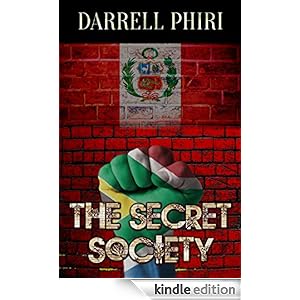Still in his early 20s, Darrell Phiri, a gifted British-African novelist, offers an insider's view into the world of apartheid in his novel The Secret Society.
A country of your own?
MJN: You have a fascinating background. You were born in the UK to Zambian parents and spent four years studying in Australia. Which country do you consider your motherland, in the political and spiritual sense? And do you think it's important to have a country to call your own? Is it more liberating to consider yourself a citizen of the universe?
DP: With my background I feel that I can adapt to any country and appreciate any culture. I am fortunate enough to have made life friends from Europe, Africa, Asia, Middle East and the Americas. However from a political sense I am interested in Zambia and so I would call it my motherland. I think that it is important to call a country your own if you have a particular interest in an activity where you would need to represent it. For example in sport or politics. However we all call this planet our own so people should be world citizens and not close their thinking to the confines of their national borders. It is a balancing act, in my opinion.
The fist of freedom
MJN: I love the cover of your book. It's very striking and mysterious. It appeals to certain emotions without revealing too much. In a way it reminds me of murals in Northern Ireland (a country I've written about in my own novels). Can you talk about the story behind the cover?
DP: I had some ideas for the cover. I wanted it to be liberating, but my publisher went beyond my expectations. The cover shows the struggle that the main character went through to fight for independence during Apartheid. This cover was in the first batch of samples that she showed me and I was immediately drawn to it.
Rebellion within rebellion
MJN: I am very glad that you decided to explore the issue of corruption and backstabbing within the revolutionary circles. I think it's tempting for many outsiders to have a very romantic vision of freedom-fighters, always assuming that they are on the same side.
DP: Yes, I think it was important to remember that different freedom fighting groups had been formed for different reasons. Some had varied political agendas whilst others were focusing on the fight more than what should come next. It is also crucial that we remember that some were funded through international donors, domestic business people and it is possible that some would have been financed through crime.
Your family's view of your work
MJN: You mentioned that you started writing around the same time your mother became ill with breast cancer. It's not uncommon to produce our best work under the most stressful of circumstances. Was your mother aware of you seeking comfort in writing?
DP: My mother was aware at the time. However she was in bed most of the time and when she woke up I would stop and attend to her so I don’t think that she really believed that I would finish. As a child I had a bit of a reputation for not finishing projects that I started, but my first book was the beginning of a change. Now both of my parents have a lot of belief in my writing and I hope that I will continue to improve as the years go by. Writing has gone from being a hobby to a way of life for me so getting published was a dream come true.
Your literary voice coach
MJN: If you had to talk about your literary idols and authors who influenced your style, which names would you mention? I am talking about figures from classical literature and modern bestsellers.
DP: My favourite authors are John Grisham and David Baldacci; I think that they have a great influence on my writing. I enjoy biographies written by or for politicians. My favourites have been on figures such as Barack Obama, Nelson Mandela and John F. Kennedy.

No comments:
Post a Comment